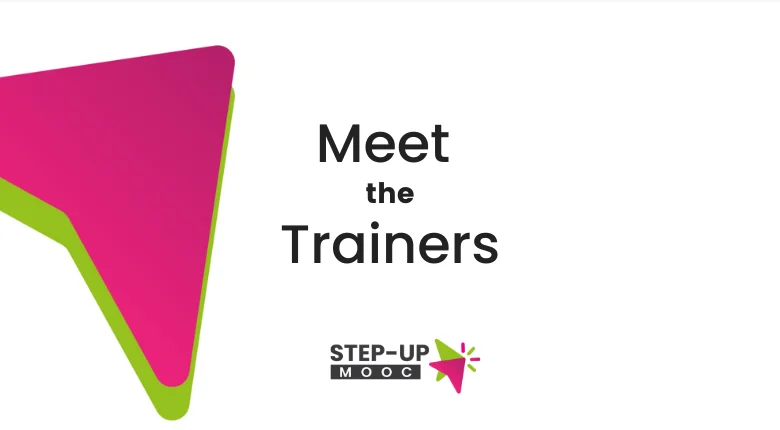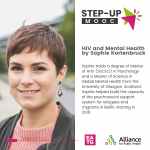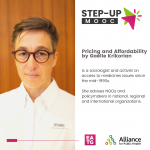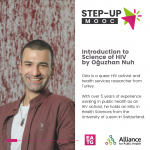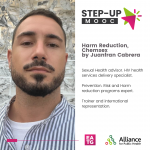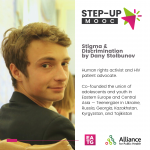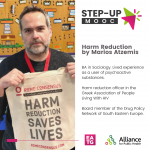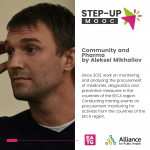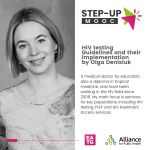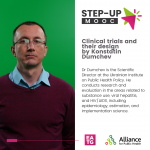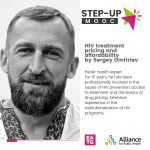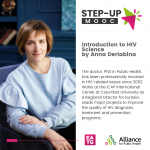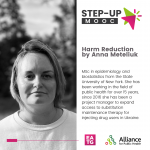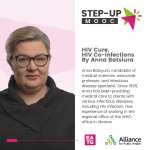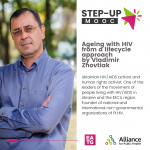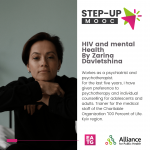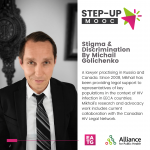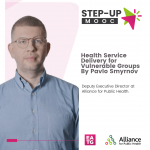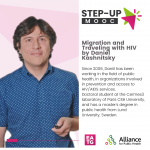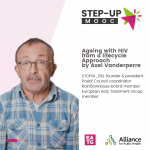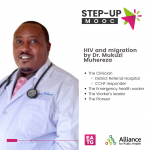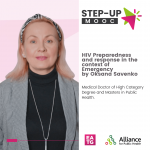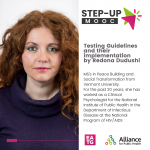STEP-UP MOOC is in full swing now and more than 160 trainees have signed up and followed the online course. Do you want to know more about what’s inside the box? Here we are sharing information about our expert trainers and the diverse topics they cover.
1.HIV and Mental Health by Sophie Kortenbruck
Sophie holds a degree of Master of Arts (SocSci) in Psychology and a Master of Science in Global Mental Health from the University of Glasgow, Scotland. Sophie helped build the capacity of the psychosocial support system for refugees and migrants in Berlin, starting in 2016.
Her Training will cover:
- Basics of HIV & Mental Health;
- Why Mental Health is important for stopping HIV;
- HIV & Dealing with Emotion;
- Pleasure, Activism and Sexual Health;
- Integrating Mental Health advocacy in your work.
2. Pricing and Affordability of Health Products by Gaëlle Krikorian
Gaëlle is a sociologist and activist on access to medicines issues since the mid-1990s. Her researches concern social movements, globalization and trade negotiations, and public policies on health and technologies. She is the author of a number of articles on pharmaceutical policies, public policies involving medical technologies, social mobilizations and collective action, common goods, and intellectual property rights.
Training consists of 5 chapters:
- Evolution of the prices of health products;
- Patents on medicines;
- The World Trade Organization (WTO) and access to health products;
- Medical Research & Development (R&D) and Intellectual Property (IP) protection;
- Access problems: the failure of the market theory;
- How to get good R&D, good prices & access?
3. Introduction to the Science of HIV by Oğuzhan Nuh
Ozla is a queer HIV activist and health services researcher from Turkey. With over 5 years of experience working in public health as an HIV activist, he holds an MSc in Health Sciences from the University of Luzern in Switzerland. Ozla’s course covers:
- Transmission Routes;
- The Structure and life cycle of HIV;
- HIV treatment;
- Classes of HIV medication;
- Global goals and pipeline.
4. Risk and harm reduction: Chemsex by Juanfran Cabrera
Juan is a psychologist and sexual health advisor in a Spanish HIV and LGBBQ+ organization called Apoyo Positivo. Sexual Health advisor. HIV health services delivery specialist. Risk and Harm reduction programs expert. Trainer and international representation. During the course, participants will know how to:
- Assist workers in supporting people who are at risk of, or who are already having problematic use of chemsex;
- Gain accurate information about the chemsex phenomenon;
- Leaning chemsex drugs, routes of consumption and associated risk and harm;
- Understand the connections between mental health, substance use, stigma, and discrimination etc.
5. HIV Stigma & Discrimination by Dany Stolbunov
Dany is a human rights activist and HIV patient advocate. Co-founded the union of adolescents and youth in Eastern Europe and Central Asia — Teenergizer in Ukraine, Russia, Georgia, Kazakhstan, Kyrgyzstan, and Tajikistan. In Dany’s training, you’ll know about:
- HIV Stigma;
- Internal and External Stigma;
- Discrimination;
- An intimate connection of stigma, discrimination and human rights;
- Stigma-reduction approaches and practical solutions on how to fight stigma in your communities.
6. Harm Reduction by Marios Atzemis
Marios possesses BA in Sociology. Lived experience as a user of psychoactive substances. He is a harm reduction officer in the Greek Association of People Living With HIV and a Board member of the Drug Policy Network of South Eastern Europe. His training will help you:
- Understand the basics of harm reduction in all aspects;
- Get a detailed description of all harm reduction approaches;
- Highlight the strengths of peer-led harm reduction;
- Understand the relation between HIV and harm reduction strategies.
7. Relationships between Community and Pharma by Aleksei Mikhailov
Since 2013, Aleksei works on monitoring and analyzing the procurement of medicines, diagnostics and preventive measures in the countries of the EECA region. Conducting training events on procurement monitoring for activists from the countries of the EECA region. His training will help you:
- Learn the origins and causes of patient activism;
- Understand why it is necessary to monitor the activities of pharmaceutical companies;
- Find out what are the main ways of interaction between patient communities and drug manufacturers;
- Know the strongest negotiation platforms;
- Join the movement of activists who work to improve access to treatment and diagnosis.
8. HIV testing Guidelines and their implementation by Olga Denisiuk
A medical doctor by education, also a diploma in tropical medicine, and has been working in the HIV field since 2008. Her main focus is services for key populations, including HIV testing, PrEP and HIV treatment access services. Olga covers the next things in her training:
- Approaches, provision and principles to delivering HIV testing services;
- Diagnosing HIV;
- Digitally assisted HIV testing services;
- Ways to help preventive testing;
- Community-based pre-exposure prophylaxis for HIV;
9. Clinical trials and their design by Konstantin Dumchev
Dr. Dumchev is the Scientific Director at the Ukrainian Institute on Public Health Policy. He conducts research and evaluation in the areas related to substance use, viral hepatitis, and HIV/AIDS, including epidemiology, estimation, and implementation science. Topics will be covered:
- Why do we need clinical trials;
- Types of clinical research and place of trials among them;
- Types and Phases of clinical trials;
- Key terms: randomization, placebo, blinding;
- Considerations for Participation;
- Community involvement.
10. HIV treatment pricing and Affordability by Sergey Dmitriev
Public health expert. For 15 years, he has been professionally involved in the issues of HIV prevention, access to treatment and the basics of drug pricing. Sergey is the executive director of the Health Advocacy Coalition (HAC). During his training, Sergey shares with you:
- Why would the community care about drug prices at all?;
- Why, in fact, prices are unreasonably high?;
- What are the price reduction mechanisms?;
- Nothing about us without us principle and many more.
11. Introduction to HIV Science by Anna Deriabina
Anna is a doctor, with a PhD in Public Health, and has been professionally involved in HIV-related issues since 2002. Works at the ICAP International Center at Columbia University as a Regional Director for Eurasia. Leads major projects to improve the quality of HIV diagnosis, treatment and prevention programs. Anna covers:
- The history of the origin of HIV and the rise of the HIV pandemic;
- The epidemiological situation of HIV in the world;
- Ways of HIV transmission;
- The life cycle of HIV;
- HIV reservoir;
- Stages of development of HIV infection;
- Antiretroviral therapy;
- HIV prevention.
12. Harm Reduction by Anna Meteliuk
MSc in epidemiology and biostatistics from the State University of New York. She has been working in the field of public health for over 15 years, since 2016 she has been a project manager to expand access to substitution maintenance therapy for injecting drug users in Ukraine. Anna’s training will highlight:
- Injection drug use;
- The concept of “harm reduction”;
- Needle and syringe programs;
- Opioid substitution therapy;
- Overdose prevention.
13. HIV Cure, HIV Co-infections by Anna Batsiura
Anna is a candidate for medical sciences, associate professor, and infectious disease specialist. Since 1999, Anna has been providing medical care to clients with various infectious diseases, including HIV infection. Has experience working in the regional office of the WHO office in Ukraine. You will discover:
- Complications of curing HIV infection;
- Stages of HIV cure research;
- Current HIV Cure Strategies.
14. Ageing with HIV from a lifecycle approach by Vladimir Zhovtiak
Vladimir is a Ukrainian HIV/AIDS activist and human rights activist. One of the leaders of the movement of people living with HIV/AIDS in Ukraine and the EECA region. Founder of national and international non-governmental organizations of PLHIV. Training includes:
- Epidemiology;
- Pathogenesis;
- Accompanying illnesses;
- Management of ageing with HIV (ART, physical activity, management of menopause in women with HIV);
- Non-medical challenges: the life of an older person with HIV;
- Medical Concerns: Recommendations for Health Care for Older Patients with HIV;
- Older women with HIV;
- Elderly patients in resource-limited settings.
15. HIV and mental Health by Zarina Davletshina
Zarina works as a psychiatrist and psychotherapist. For the last five years, she has given preference to psychotherapy and individual counselling for adolescents and adults. Trainer for the medical staff of the Charitable Organization “100 Percent of Life, Kyiv region. On Zarina’s training, you can discover all about HIV and the Mental Health of women, adolescents, and sex-positivity.
16. Stigma & Discrimination by Michail Golichenko
Michail is a lawyer practising in Russia and Canada. Since 2008, Mikhail has been providing legal support to representatives of key populations in the context of HIV infection in EECA countries. Mikhail’s research and advocacy work includes current collaboration with the Canadian HIV Legal Network. Consists of 5 parts:
- Definition of stigma and discrimination. UNAIDS position;
- Types and forms of stigma. Forms of discrimination;
- Impacts of stigma and discrimination in the context of HIV;
- Working to reduce HIV-related stigma and discrimination.
17. Health Service Delivery for Vulnerable Groups by Pavlo Smyrnov
Deputy Executive Director at Alliance for Public Health educates on:
- Definition of vulnerable groups;
- Identification of structural barriers to accessing services;
- Principles and requirements for medical services;
- Group Identification and Availability Issues;
- Characteristics and technologies of models;
- Issues of verification and monitoring;
- Examples of care delivery models.
18. Migration and Traveling with HIV by Daniel Kashnitsky
Since 2006, Daniil has been working in the field of public health, in organizations involved in prevention and access to HIV/AIDS services. Doctoral student at the Cermes3 laboratory of Paris Cité University, and has a master’s degree in public health from Lund University, Sweden.
Daniil’s training includes:
- Definitions of migration;
- Demographic data on migration processes in the world;
- Barriers to accessing health care for migrants and refugees, and common access strategies;
- What is the assistance infrastructure for migrants?;
- The role of stigma and in this context — perceptions of migrants by health professionals in receiving countries.
19. Ageing with HIV from a lifecycle Approach by Axel Vanderperre
Axel is UTOPIA_BXL founder & president, Positif Council coordinator, RainbowHouse board member, and European Aids Treatment Group member. His training covers:
- Epidemiology;
- Pathogenesis;
- Accompanying illnesses;
- Management of ageing with HIV (ART, physical activity, management of menopause in women with HIV);
- Non-medical challenges: the life of an older person with HIV;
- Medical Concerns: Recommendations for Health Care for Older Patients with HIV;
- Older women with HIV;
- Elderly patients in resource-limited settings.
20. HIV and Migration by Dr. Mukuzi Muhereza
Dr Mukuzi is the Clinician at a District Referral Hospital, the Emergency health worker and the Worker’s leader. He highlights on:
- Prevention in hostile/migrant environments;
- HIV in a conflict setting;
- Sex as a coercion tool;
- Care and support in migration setting;
- Challenges in logistics in migration setting.
21. HIV Preparedness and Response in the Context of Emergency by Oksana Savenko
Oksana is a Medical Doctor of High Category Degree and a Master’s in Public Health. She is presenting the latest info on:
- The rationale for a specific HIV/AIDS intervention in crisis;
- Addressing HIV/AIDS in emergency settings;
- Groups at risk;
- Establish coordination mechanisms;
- Monitoring activities;
- Prevent and respond to sexual violence and exploitation.
22. Testing Guidelines and their Implementation by Redona Dudushi
Redona possesses MS in Peace Building and Social Transformation from Vermont University. For the past 20 years, she has worked as a Clinical Psychologist for the National Institute of Public Health in the Department of Infectious Disease at the National Program of HIV/AIDS. Redona shares:
- Guidance on key operational and service delivery issues that need to be addressed to increase HIV testing;
- Knowledge of HIV prevention strategies as an important element in reducing HIV transmission.
STEP-UP MOOC is an innovative bilingual (English/Russian) training initiative that brings together activists and experts in the field of HIV. With a combination of self-paced e-learning and face-to-face workshops, this Massive Open Online Course is designed to empower activists, advocates, and individuals interested in making a difference.

